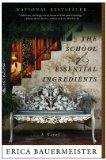Summary | Excerpt | Reading Guide | Reviews | Beyond the Book | Readalikes | Genres & Themes | Author Bio

She shook the last of the water from the potatoes. The skins
came off easily, like a shawl sliding off a woman’s shoulders.
Lillian dropped one hunk after another into the big metal bowl,
then turned on the mixer and watched the chunks change from
shapes to texture, mounds to lumpy clouds to cotton. Slices of
butter melted in long, shining trails of yellow through the moving
swirl of white. She picked up the smaller pan and slowly
poured the milk into the potatoes. Then salt. Just enough.
Almost as an afterthought, she went to the refrigerator
and pulled out a hard piece of Parmesan cheese. She grated
some onto the cutting board, then picked up the feathery bits
with her fingers and dropped them in a fine mist into the
revolving bowl, where they disappeared into the mixture. She
turned off the mixer, then ran her finger across the top and
tasted.
“There,” she said. She reached up into the cabinet and took
down two pasta bowls, wide and flat, with just enough rim to
hold an intricate design of blue and yellow, and placed them
on the counter. Using the large wooden spoon, she scooped
into the potatoes and dropped a small mountain of white in the
exact center of each bowl. At the last minute, she made a small
dip in the middle of each mountain, and then carefully put in
an extra portion of butter.
“Mom,” she said, as she carefully set the bowl and fork in
front of her mother, “dinner.” Lillian’s mother shifted position
in her chair toward the table, the book rotating in front of her
body like a compass needle.
Lillian’s mother’s hand reached for the fork, and deftly navigated
its way around the Collected Works and into the middle of
the potatoes. She lifted the fork into the air.
“It was the first time, in a manner, that I had known space and
air and freedom, all the music of summer and all the mystery of
nature. And then there was consideration — and consideration was
sweet. . . .”
The fork finished the journey to Lillian’s mother’s mouth,
where it entered, then exited, clean.
“Hmmmm . . .” she said. And then all was quiet.
“I’ve got her,” Lillian told Elizabeth as they sat eating toast
with warm peanut butter at Elizabeth’s house after school.
“Because you got her to stop talking?” Elizabeth looked
skeptical.
“You’ll see,” said Lillian.
Although Lillian’s mother did seem calmer in the following
days, the major difference was one that Lillian had not anticipated.
Her mother continued to read, but now she was absolutely
silent. And while Lillian, who had long ceased to see her
mother’s reading aloud as any attempt at communication, was
not sorry to no longer be the catch-pan of treasured phrases,
this was not the effect she had been hoping for. She had been
certain the potatoes would be magic.
On her way home from school, Lillian took a shortcut down
a narrow side street that led from the main arterial to the more
rural road to her house. Halfway down the block was a small
grocery store that Lillian had found when she was seven years
old on a summer afternoon when she had let go of her mother’s
hand in frustration and set off in a previously untraveled direction,
wondering if her mother would notice her absence.
On that day years before, she had smelled the store before
she saw it, hot and dusty scents tingling her nose and pulling
her down the narrow street. The shop itself was tiny, perhaps
the size of an apartment living room, its shelves filled with
cans written in languages she didn’t recognize and tall candles
enclosed in glass, painted with pictures of people with halos
and sad faces. A glass display case next to the cash register was
filled with pans of food in bright colors — yellows and reds and
greens, their smells deep and smoky, sometimes sharp.
The woman behind the counter saw Lillian standing close
to the glass case, staring.
From the prologue to The School of Essential Ingredients by Erica Bauermeister. Copyright Erica Bauermeister 2009. All rights reserved. No part of this book maybe reproduced without written permission from the publisher.
Your guide toexceptional books
BookBrowse seeks out and recommends the best in contemporary fiction and nonfiction—books that not only engage and entertain but also deepen our understanding of ourselves and the world around us.